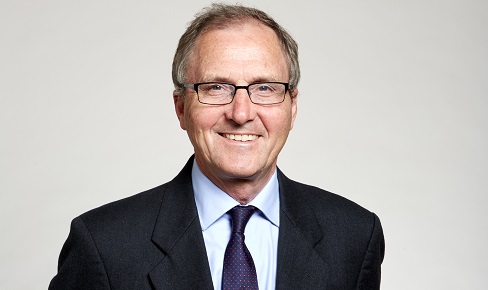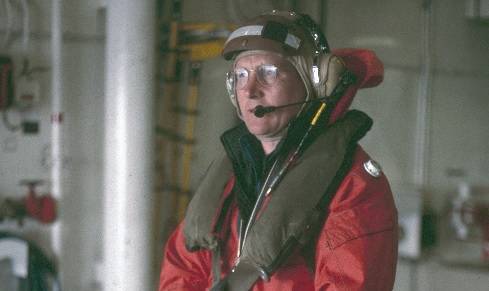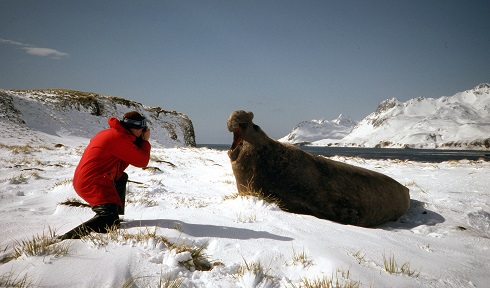‘I'm supporting an institution that is supporting biology’

The RSB’s new president, Professor Sir Ian Boyd, talks to The Biologist about his experiences as a government chief scientific adviser and his ideas for supporting and promoting UK science
September 12th 2022
In May Professor Sir Ian Boyd took over from Professor Dame Julia Goodfellow as president of the RSB.Sir Ian was chief scientific adviser at Defra from 2012 to 2019 and is professor of biology at the University of St Andrews. With a background in marine ecology, his interests are now focused on sustainability (he co-chairs the First Minister’s Environmental Council for Scotland with Nicola Sturgeon and is chair of St Andrews’ environmental sustainability board) and supporting science (he is a board member of UK Research and Innovation and chairs the UK Research Integrity Office).
He is also a non-executive director of Fera Science, a centre of excellence for sustainable problem-solving in the agricultural and environmental sectors, and a supporter of conservation of the Hebrides, where he has a home on the island of Tiree.
Can you tell us a bit about your involvement with the RSB and what attracted you to the role of president?
It’s a wonderful honour to be asked by an organisation such as the Society to be its president. It enables me to extend, in a very practical way, the underlying rationale for wanting to be a Fellow of the RSB, which is to support an institution that is supporting biology. The role of science in the future is going to be very important across society. But many people don’t fully appreciate what the different sciences do for us – biology in particular – and I think that we all need to get better at talking about what we do. Although I’m a biologist by background, I also have quite a lot of experience of governance. The Society needs good governance and it’s good to be able to bring my experience of that to the RSB.
 Sir Ian Boyd has a background in marine and polar ecology and brings a wealth of experience in governance to the Society
Sir Ian Boyd has a background in marine and polar ecology and brings a wealth of experience in governance to the SocietyHave you had a chance to think about some of your aims as president?
There are lots of things that the RSB is doing that I think are interesting – the question is how to zero in on the things where I can make the most difference. As president I think it’s my role to represent the organisation and to be an external front for it, but also to make sure that it is well run.
My job as president – if it was brought down to brass tacks – is to make Council function and run as well as it possibly can. Another question in my mind is what does the Society provide to members in terms of a value product? The Biologist is one thing that members really value, but in my experience of speaking to people so far there isn’t a clear single message on that question – different people get different things from the RSB. If we want to increase our reach into the biological community, then we need to be very conscious about what we invest in to appeal to them.
In doing that, we must also be cognisant of equality, diversity and inclusion (ED&I). We need to look at that as an organisation, but we also need to help the whole field of biology raise its game with respect to ED&I and that’s never an easy thing to do – it’s not going to be solved overnight.
In terms of supporting science as a profession – do you think it’s a good time to be a scientist right now? Are biologists happy with their lot?
It’s always a good time to be a scientist – ever since William Whewell came up with the word there’s been interesting things to research and study. Science is like a fractal structure: you look into it and it just becomes more and more interesting. The actual day-to-day experience that people have I think varies hugely, however. Some sectors of the science community are treated by society extremely well and very generously. However, it’s often difficult for people to progress their careers to get to that stage.
Of course, that’s what you get in an elitist subject, and scientific research is elitist – there are no two ways about it. I sometimes like to compare people who are at the top of the game in scientific research to highly trained athletes. You can’t afford not to be absolutely 100% committed to your subject. It’s tough for many people and not everybody is going to succeed as a researcher, but there are lots of other ways of being a successful biologist.
The question is can we make scientific careers just as satisfying for people who choose other options than research? We can start by valuing them appropriately. I think that’s where things like The Biologist help hugely, because when you read it you’re reminded of all the wonderful reasons why you became a biologist.
• Chief scientific adviser at Defra, 2012–2019
• Undergraduate in Zoology, University of Aberdeen
• NERC PhD student, Cambridge University
• Physiological ecologist at the NERC Institute of Terrestrial Ecology
• Science programme director of the British Antarctic Survey
• Director of NERC’s Sea Mammal Research Unit
• Director of the Scottish Oceans Institute
• Acting director and chairman of the Marine Alliance for Science and Technology for Scotland
• Recipient of the Scientific Medal of the Zoological Society of London, the Bruce Medal and the Polar Medal
• Fellow of the RSB, the Royal Society of Edinburgh and the Royal Society
• Currently co-chairs the First Minister’s Environmental Council for Scotland, is a board member of UK Research and Innovation, and chairs the UK Research Integrity Office
You’ve worked as a chief scientific adviser in a major government department. Do the messages to government presented by learned societies such as the RSB get through to the people who need to hear them?
Yes and no. When new policy is being developed there’s a consultation process that goes on that the RSB and other learned societies are all part of. They all go into the machine and are ground up into a view of what the community thinks about a particular issue. So in that sense, yes, the RSB and other learned societies are being listened to by the machinery of government.
The influence of that in key decision-making – for example, in what the level of the science budget should be – can be quite small, however, because the decisions are made for political reasons and not necessarily from a pure science delivery perspective. In government the key decisions come down to a conversation around a table. If you don’t have a presence in the room at the time of the conversation, then your influence is limited.
I don’t think the RSB can work on its own here – it needs to work in tandem with the other learned societies, including the Royal Society, which tends to have pole position on influencing. When the learned societies don’t work together I think that’s to the overall detriment of the influence of science within the political scene.
More generally, how healthy is the relationship between scientific advice and policy-making right now? Is it getting better?
It’s going in the right direction in that government has recognised that it does need to bring science inside each department. There is an interesting contrast between how the UK works and how France or Germany work, where they don’t have that sort of system, but they do have science advice coming in. Is more attention paid to science advice in the UK system than it is in those other systems? I don’t think there’s an easy answer to that – the differences are marginal rather than massive.
Ultimately, decisions are still made in rooms within Whitehall with a few people around the table. If you have a chief scientific adviser at the table, then it can make a difference. If the science advice is a piece of paper or a report sitting in the middle of the table, it’s less likely to. The personal relationships between scientists in the department and the senior officials makes a huge difference to whether science advice is used in that way or not.
So, much of it really comes down to the personality of the minister – their openness to using evidence and scientific advice?
It’s down to lots of different things, including the personality of the minister, senior officials and also the scientific adviser. One of the things that I was always asking myself was: “What are my optimal behaviours for maintaining the personal relationships between these people, but also retaining my independence?” There is a tension there between being the person in the room who’s going to say: “Hey, this is just crazy” and being somebody who is not invited into the room because you’re going to be a bundle of trouble.
There’s a mash of social relationships there, which as a chief science adviser you are part of, but you have to try to understand it and play your part in it in such a way that it doesn’t compromise your capacity to be an independent voice as well.
 A close encounter with a large male elephant seal
A close encounter with a large male elephant sealThere are so many interconnected crises at the moment, most of which have a scientific angle to them – whether it’s climate change, biodiversity loss, food insecurity, health inequalities, antibiotic resistance… I sense that many scientists are becoming exasperated – for all their hard work there’s just not enough political or social action being taken. How do you stay motivated and optimistic that we can achieve real change in areas such as sustainability, which can feel like fighting against the tide?
I did wonder whether I was just at an age where it seems like I know a lot about all these things going wrong but, no, I do think the number of challenges we face is increasing, and they are becoming more difficult to fix and they are going to affect multiple aspects of how societies operate. There are all these massive challenges, but I’m optimistic because I think science is at the root of the answer to these.
This is where what I think becomes a little controversial because in the past, many people – me included – have said that science mustn’t get involved in politics. But, actually, I don’t think science cannot get involved in politics any more. There has always been an understanding that scientists play a particular role: public money is passed on to the science community and it does good things with that money, generating knowledge that is used to make people’s lives better or to make ourselves secure.
We have to become participants in the democratic process more directly, but we must do it in a particular way, and this is where the complexity comes in. I’m not meaning you join a particular political party necessarily. If you imagine we have a two-axis system where ideology sits along the x-axis, from left to right, then the y-axis is reality, what I think science needs to do is to pull everyone up off the ideological axis and bring reality to bear on day-to-day decision-making. At the moment we’re not doing that in a direct enough way.
Perhaps more scientists can get elected on an independent ticket; maybe we need a party of scientists. That could work in electoral systems where there is proportional representation – one reason why the Greens have a casting vote in the Scottish parliament. But at the moment we are not organised enough to make that happen. We seem to be quite happy to step aside from politics, do our own thing and throw our reports and scientific papers over the wall and say: “Well, here it is. Please use it.” I don’t think we can go on in that way.
Sir Ian Boyd FRSB is professor of biology at the University of St Andrews and was chief scientific adviser at DEFRA from 2012 to 2019.


